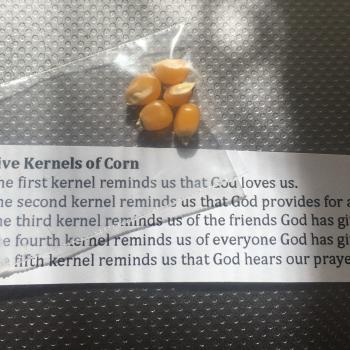Should Christian teens memorize Bible verses in a competition to win $100,000– in a commercialized game show?
According to ChristianCinema.com, the answer is yes. This year marked production of the second season of “The National Bible Bee Game Show” hosted by actor Kirk Cameron in which four teenagers compete. (There’s also a “Jr.” version, in which younger contestants can win $50,000.)
The show’s site quotes Cameron as saying, “this is what it’s about – proclaiming God’s word.”
Really?
Competing for money over who knows what in the Bible is proclaiming God’s word? At first, I thought this was a joke. But it’s not.
How much does memorizing a Bible verse cost? $1, $100, $150? If you get in the answer wrong do you lose money like contestants do in the game, Jeopardy?
The Bible, the Holy Word of God, was first categorized into chapters in 1205 by Roman Catholic Cardinal Stephen Langton, whose chapter divisions of the Bible mirrored his colleague, Cardinal Hugo de Sancto Caro’s, division of the Latin Vulgate into chapters. (In the 16th century, the same chapter division was used in the Greek language New Testament manuscripts.)
Verses to these chapters were added by the French publisher and classical scholar, Robert Estienne (Robert Stephanus), who was the first person known in the West to number each verse in each chapter. His numbered verses were first printed in editions of the New Testament of the Bible in 1551, and in the Old Testament in 1571.
There are 66 books in the Bible comprised of 1,189 chapters and 31,102 verses. In the Old Testament these books consist of 929 chapters and 23,145 verses; in the New Testament, 260 chapters and 7,957 verses.
Some traditionalists and modern scholars criticize chapter and verse divisions of the Bible for several reasons. Most obvious is that the authors of the text did not categorize them by chapter and verse. Likewise, the way in which some texts are divided, some argue, encourages citing passages out of context, furthering misunderstandings. Regardless, the chapter/verse construct has enabled people to memorize verses and is especially useful for Bible study.
Several publications of the Bible exclude chapters and verses, like Biblica’s 2007 and 2011 NIV, Crossway’s 2014 ESV Reader’s Bible, and Bibliotheca’s modified ASV.
But for those publishers that still do include the chapter/verse model, perhaps they should charge by the chapter and verse– they might make more money.
The National Bible Bee Game Show certainly found a way to commercialize the Holy Word of God.
According to the site, each contestant is tasked with memorizing 850 Bible verses from 250 passages. The game consists of four rounds:
- The Bible Knowledge Buzzer Round: contestants answer multiple choice questions like, “Which of the twelve tribes was Esther from?”
- The Recitation Round: contestants recite and interact with the judges about a Bible passage.
- The General Bible Knowledge Round: contestants answer questions with a written response.
- The Recitation Buzzer Round: contestants must identify the larger passage of a shorter one first read by the judge and then recite it correctly.
Whoever wins the rounds moves on, narrowing the number of contestants from 4 to 2. Then, the winner collects $100,000.
What’s next– will ChristianCinema.com create a reality television show and award contestants who attend the most church services?
Is this what memorizing Bible verses in America has come to– winning $100,000?
What a disgrace– and mockery of those who don’t have even partial excerpts of a Bible to memorize. Not to mention the false witness that this communicates to nonbelievers that it’s OK to commercialize the Holy Word of God. God’s purposes are Holy. God spoke in order to bring his people to him through His Son. Did God speak so that people could compete over his words?
Memorizing Bible verses can include various forms of learning that are fun, informative, and educational. Many people have memorized Bible verses through song, melody, art, or other creative means. But the purpose of memorizing Bible verses is to know God, to learn from the wisdom that only he alone can provide, and to apply this to all areas of living. Knowing that a Holy God, the creator of the universe, is the author of every verse, how is it that the same words could be used to mock him?
Imagine the Apostle Peter or Paul competing in the public square in Athens over which Old Testament verse they could recite better, and the crowd pays them for their answer. Better yet, imagine Christians competing in the coliseum over who memorized more verses correctly. Maybe Stephen could have offered the crowd money to learn scripture, to avoid being stoned to death.
These are not any more ludicrous scenarios than a television show that commercializes that which is sacred.
If there’s anything one can learn from the passages of Matthew 21:13-12 and John 2:11-12, it’s that Jesus expressed righteous anger against those who insulted God’s holiness. His disciples referred to the verse, Psalm 69:9 (“Zeal for your house consumes me, and the insults of those who insult you fall on me.”), when describing Jesus overthrowing the money changers in the temple.
Perhaps this passage should be read and understood before any more game shows about the Bible and Jesus are bought and sold for profit.
















